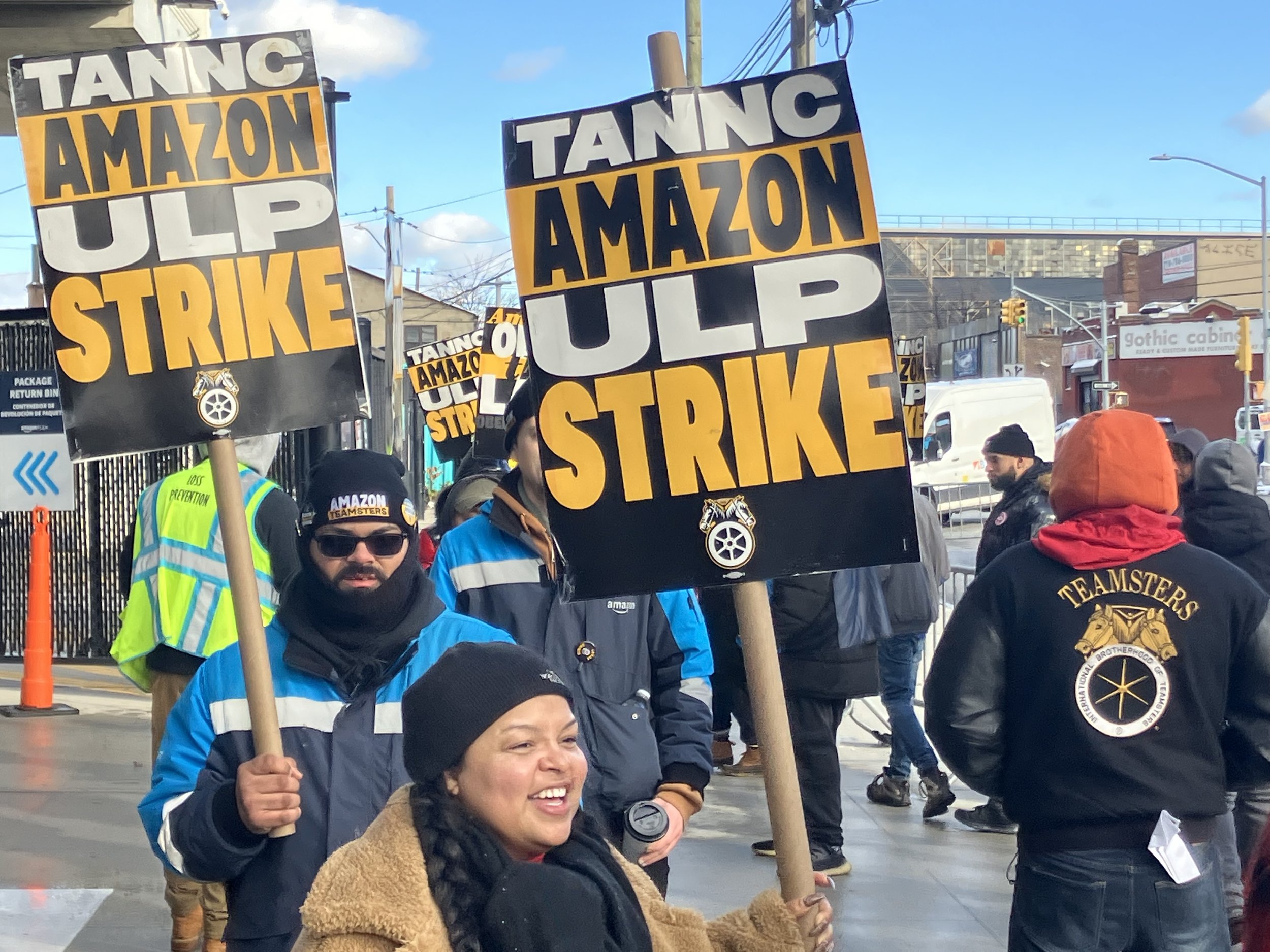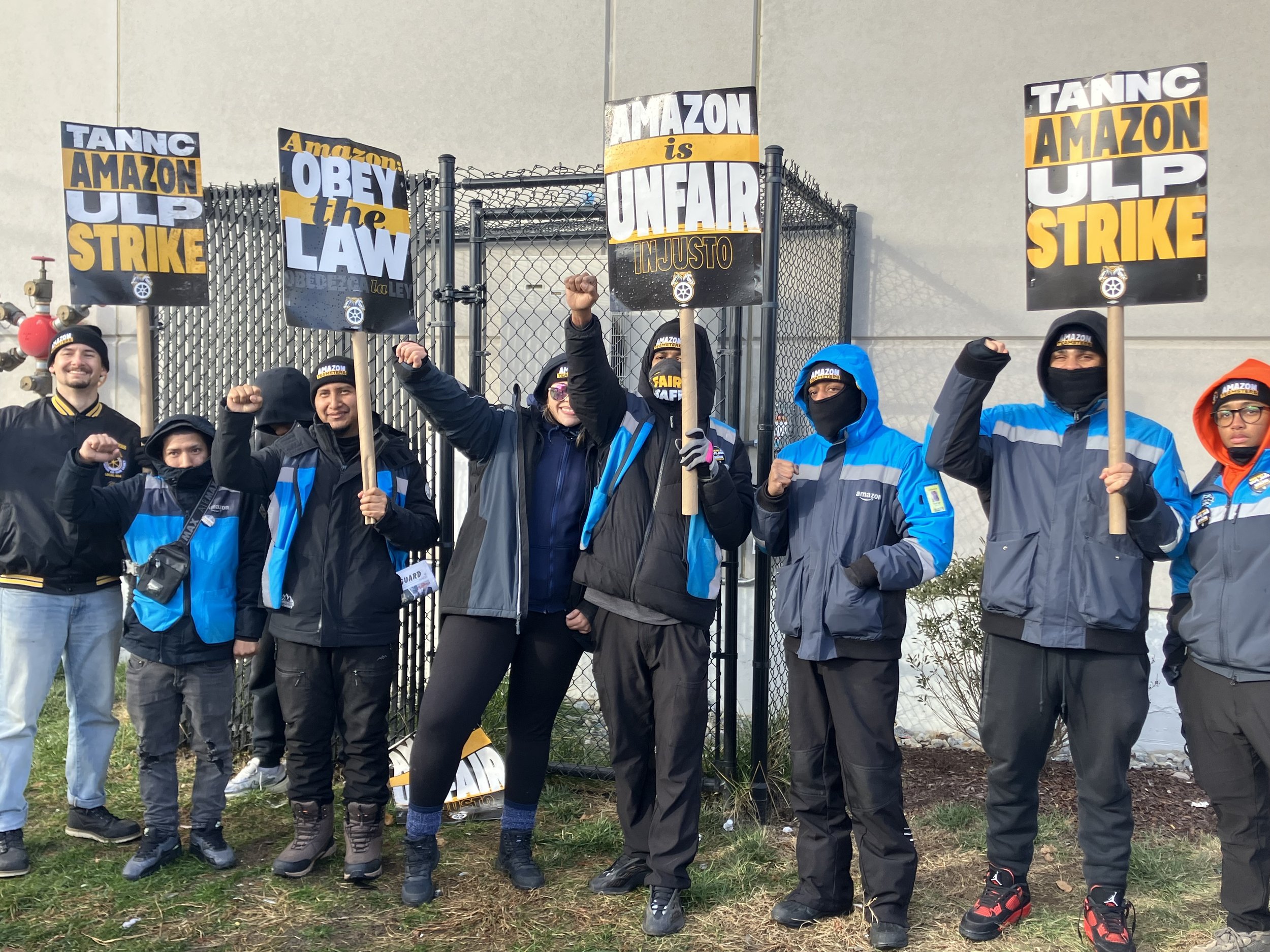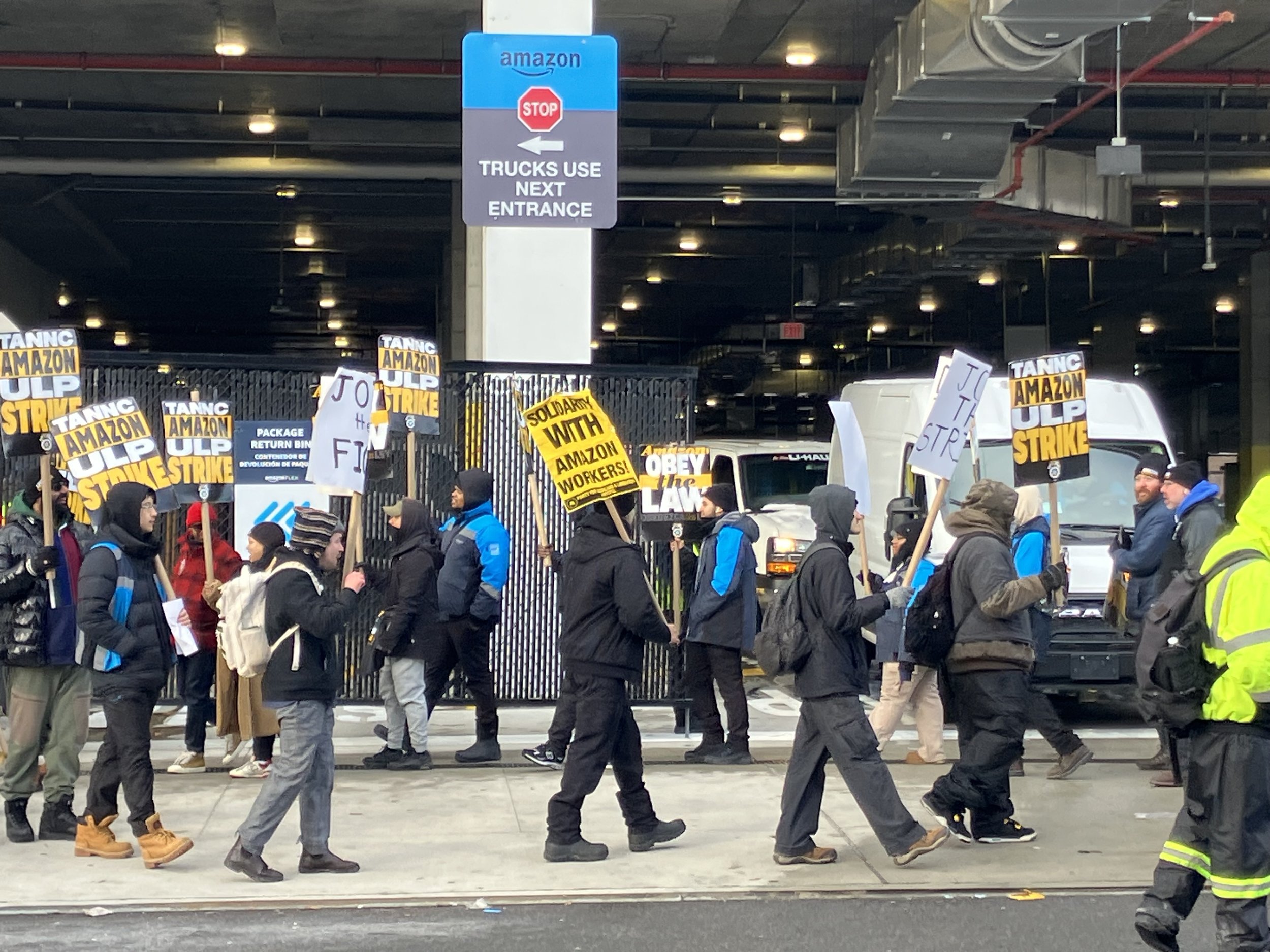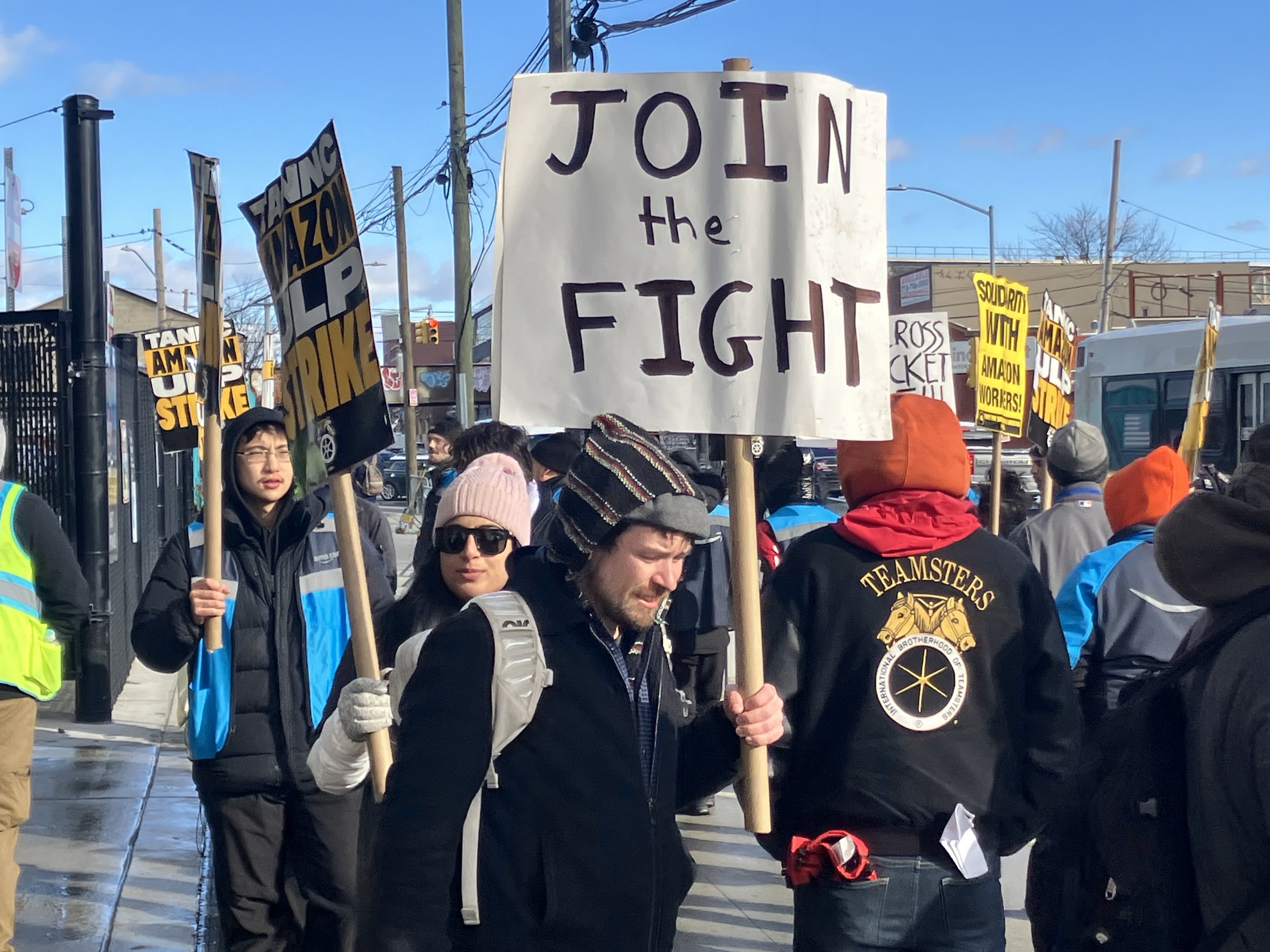Cops Clashed with Amazon Strikers in NYC—So, How Do We Avoid an Ugly Repeat of History?
Striking Amazon drivers picket in front of the corporation’s DBK4 Distribution Center in Maspeth, Queens on Saturday, Dec. 21.
By Joe Maniscalco
The ugly confrontation between NYPD officers and striking Amazon drivers outside the corporation’s DBK4 Distribution Center in Maspeth, Queens last Thursday continues a long history of law enforcement clamping down hard on labor uprisings across the United States.
So, what happens next? And how should the House of Labor react?
“[Amazon] is trying to use the police to intimidate workers,” Teamsters organizer Cody Eaton told Work-Bites outside the DBK4 building on Saturday. “We saw a worker who decided to honor the picket line and cops dragged him out of his van—if that's not class collaboration, I don't know what is.”
The launch of what the Teamsters are calling the largest ever strike against Amazon on Dec. 19, saw the arrests of Amazon delivery driver Jogernsyn Cardenas and Teamsters organizer Tony Rosario.
“We’ve also seen for months that the New York Police Department has kept their barriers on Amazon property. Why isn’t that clear evidence of the police and Amazon colluding?” Eaton continued. “The police seem to want to protect Amazon. They infringe on our rights to exercise our First Amendment rights and to peacefully assemble to protest unfair labor practices at this company.”
Amazon driver tuned Teamsters organizer Cody Eaton [far left] stands in solidarity with striking drivers.
Eaton, who worked at Amazon from 2020 to 2022, called the NYPD’s conduct on Dec. 19 “disappointing," “clearly intimidating,” and “trying to prevent workers from doing what they need to do to get what they deserve.”
“Frankly, if you're a union member that breaks up picket lines, I don't think you're a union member,” he added. “[Police] should honor a picket line. They enjoy what they have because of their union—we're merely asking them to respect our First Amendment right to help these workers at Amazon get a living wage.”
Joshua Freeman, distinguished professor of history [emeritus] at Queens College and the CUNY Graduate Center, told Work-Bites that law enforcement unions occupy an “unusual position in the labor movement.”
“Sometimes their members are called upon by the government to act against other unionists, in strikes and other situations,” he said. “And as racial justice advocates have documented, sometimes the unions themselves have acted to thwart holding police officers who had abused people accountable. Still, most law enforcement unions are affiliated with the AFL-CIO or with local labor councils, so they consider themselves part of the larger labor movement.”
NYPD police officers arrested two and broke up the Teamsters picket line on Dec. 19. Above: striking drivers on the picket line outside Amazon’s DBK4 Distribution Center this past weekend.
According to Freeman, it’s “Unrealistic to expect many individual police officers to refuse to enforce commands from their superiors in strike situations.”
“They serve in quasi-military organizations, in which defying an order could mean losing their jobs,” he added. “But hopefully, in New York City, with a mayor who is the child of a long-time union member and who himself long belonged to a union, pressure can be brought to bear to make sure that the police act in an impartial and fair manner, not as the agents of the employer, during the Amazon strike. The entire labor movement should be making efforts in that direction.”
Retired NYPD officer Jack LaTorre will turn 70 in March. He spent 22 years on the force, holds a Bachelor’s degree in Psychology from Hunter College, and taught Police Science at the academy.
He’s also been a stalwart participant at New York City municipal retiree rallies over the last three years fighting the City of New York’s ongoing efforts to strip former civil servants of their Traditional Medicare health insurance benefits.
In other words, Jack LaTorre knows what it’s like to be on both sides of the picket line.
“It’s always been a balancing act,” LaTorre told Work-Bites. “Just like with the military where you might not believe in what you have to do—if you're in uniform and ordered to do something, you have to do it. Now, the question is…is it a lawful order? And that’s where the gray area comes in.”
Join the Fight: Amazon workers are on strike in New York City, Atlanta, Skokie, and other sites in Southern California.
After arresting Cardenas and Rosario on Dec. 19, NYPD officers reportedly threatened the rest of the strikers with mass arrests and broke their picket line in front the DBK4 facility.
As for demonstrators, LaTorre said “maybe the best course of action is to listen to what the cops say” and always try to diffuse the situation peacefully.
“You have all these cameras these days, cell phones and security cameras,” LaTorre added, “if there's something that's egregious where the cops are doing something really wrong—you don't want to fight them on the street. I mean, if it gets to the point where you think it's going to erupt into something bad, you have to comply with it and make your complaint later.”
Work-Bites reached out to the Police Benevolent Association of the City of New York for comment on this story, but has not yet gotten a reply.
Striking Amazon drivers Jose Platencia, 46, and Richy Garcia, 34, are both fathers who told Work-Bites they are on the picket line outside the DBK4 Distribution Center because they can no longer live in New York City on their paltry wages and provide for their families.
“It’s a blessing having a family, but it’s hard with this minimum wage that I have,” Platencia said. “I’ll stay here until we accomplish what we need. I’ll be on strike until we get what we need.”
Garcia said Amazon workers are frustrated—not just here in NYC—but everywhere.
“The time is now,” he said. “Amazon needs to realize that people are not going to stand for it. Over the last two years, things have gotten worse. The package load has gone up—but the pay has stayed the same. In the economy we’re living in everything has gone up—but Amazon’s pay stays the same. I’m living off a $600 check with two kids to provide for—that’s not enough.”
Eaton insisted the DBK4 Distribution Center is a “union building” and Amazon is in clear violation of federal labor law after refusing to sit down with the union to negotiate a contract.
Amazon is already flouting National Labor Relation rules by refusing to bargain with unionized workers at the company’s JFK8 warehouse on Staten Island, where the Amazon Labor Union [ALU] became the first group of Amazon workers to successfully organize back in 2022.
“Amazon is the probably most anti-union company in the country,” Eaton added. “If we can unionize the most anti-union company in the country—what can’t we do? I think it's a massive victory for working people because Amazon is eroding what used to be solid, middle-class jobs in the logistics industry.”




